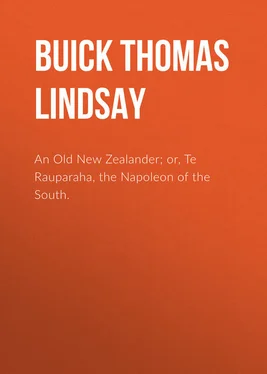Thomas Buick - An Old New Zealander; or, Te Rauparaha, the Napoleon of the South.
Здесь есть возможность читать онлайн «Thomas Buick - An Old New Zealander; or, Te Rauparaha, the Napoleon of the South.» — ознакомительный отрывок электронной книги совершенно бесплатно, а после прочтения отрывка купить полную версию. В некоторых случаях можно слушать аудио, скачать через торрент в формате fb2 и присутствует краткое содержание. Жанр: foreign_antique, foreign_prose, на английском языке. Описание произведения, (предисловие) а так же отзывы посетителей доступны на портале библиотеки ЛибКат.
- Название:An Old New Zealander; or, Te Rauparaha, the Napoleon of the South.
- Автор:
- Жанр:
- Год:неизвестен
- ISBN:нет данных
- Рейтинг книги:3 / 5. Голосов: 1
-
Избранное:Добавить в избранное
- Отзывы:
-
Ваша оценка:
- 60
- 1
- 2
- 3
- 4
- 5
An Old New Zealander; or, Te Rauparaha, the Napoleon of the South.: краткое содержание, описание и аннотация
Предлагаем к чтению аннотацию, описание, краткое содержание или предисловие (зависит от того, что написал сам автор книги «An Old New Zealander; or, Te Rauparaha, the Napoleon of the South.»). Если вы не нашли необходимую информацию о книге — напишите в комментариях, мы постараемся отыскать её.
An Old New Zealander; or, Te Rauparaha, the Napoleon of the South. — читать онлайн ознакомительный отрывок
Ниже представлен текст книги, разбитый по страницам. Система сохранения места последней прочитанной страницы, позволяет с удобством читать онлайн бесплатно книгу «An Old New Zealander; or, Te Rauparaha, the Napoleon of the South.», без необходимости каждый раз заново искать на чём Вы остановились. Поставьте закладку, и сможете в любой момент перейти на страницу, на которой закончили чтение.
Интервал:
Закладка:
"Sweet is the Spring, the September month,
When brilliant Canopus stands aloft,
As I lay within my solitary house,
Dazed with sad thoughts for my people
Departed in death like a flash.
To the cave of Rangi-totohu —
Emblem of sad disaster —
They are gone by the leadership
Of Uru, of the fearsome name.
'Twas there at the hill of Tatara-i-maka
The foe advanced in wedge-like form,
Whilst our gathered people bid defiance
At the entrance of the pa ,
Where Muru-paenga 35 35 Associated with Tuwhare and Te Rauparaha in this raid was another and equally famous chief, named Muru-paenga. That he was a great warrior is proved by the fact that his enemies speak of him in the lament already quoted as "the army-raiser, the leader," while his friend Te Taoho, in a tangi composed after his fall, refers to his "warlike eloquence," and compares him to "a richly-laden vessel, with all knowledge and great courage." But Muru-paenga is not merely famed in song, for his achievements have in a measure passed into proverb. In the taking of pas , one of his favourite stratagems was to stealthily approach the enemy's fort at nightfall, and pounce upon it with the first light of dawn. This involved the sleeping of his men amongst the tender ferns growing on the outer edge of the bush, which in the morning necessarily bore a trodden-down appearance, a fact which did not escape the keen observation of those who had oft been the victims of his tactics. Consequently, when Muru-paenga was killed by Nga-Puhi in 1826, the joyful news went through the country which he had previously devastated, and the saying was composed, in significant suggestion that the ferns and the people would no longer be crushed, "Rejoice, O ye little ferns of the woods, Muru-paenga is dead."
forced his way —
The army-raiser, the leader —
His was the fatal blow delivered,
At the ascent of Tuhi-mata:
Hence I am dried up here in sorrow."
From Tatara-i-maka the taua moved southwards, attacking Mounu-kahawai as they went. This pa was taken under cover of the smoke caused by firing the dry raupo which grew in the neighbouring swamps, and then Tapui-nikau was invested. Here the defenders, though fighting only with their rakau maori , or native weapons, made so gallant a resistance that not even the guns of the invaders could penetrate it. They had filled the fighting towers of the pa with huge boulders and smaller stones, and the branches of the trees which overhung the trenches were lined with men, who handed the missiles to those best able to drop them upon the enemy as they swarmed round the walls. 36 36 "During the siege, Tawhai (afterwards Mohi Tawhai), father of the late Hone Mohi Tawhai, M.H.R., who was with the northern contingent of the taua in the attack, was close under one of the towers of the pa when one of the defenders hurled a big stone at him which split open his head. But by careful doctoring he recovered – careful doctoring according to Maori ideas meant that they poured hot oil into the wound and then sewed it up" ( Polynesian Journal ).
Changing their tactics, the invaders drew off to a position which closed all communication with the pa , and at the same time gave them complete control of the surrounding country, so as to prevent the possibility of succour reaching the beleaguered pa . It was during the respite from active hostilities thus secured that there occurred one of those strange incidents which, though common enough in Maori warfare, appear so anomalous in the light of European custom. Te Ratutonu, one of the defending chiefs, had been so conspicuous in repelling attacks that his gallantry and skill in arms became the subject of universal admiration throughout the northern camp. But not alone upon the men had his bravery made its impression. Rangi Topeora, Te Rangihaeata's sister, had witnessed his prowess, and, charmed by his handsome figure and manly strength, had been seized with a desire to have the hero for her husband. When the clash of arms had ceased, she persuaded her uncle, Te Rauparaha, to have Ratutonu "called," a ceremony which was performed by some one approaching the beleaguered pa , and under a guarantee of safety, inviting the warrior into the camp. Ratutonu obeyed the summons, and came down from the pa to meet Topeora; and to her he was married after the orators had delivered themselves of speeches rich in eulogy of their new-found kinsman, and full of admiration for the virtues of his bride. 37 37 Topeora did not secure her husband without a struggle, for another lady, Neke-papa, had also taken a fancy to the handsome warrior, and as Te Ratutonu was leaving the pa , a dispute arose as to which should have him. But Topeora, being fleet of foot, ran to meet the advancing warrior, and cast her topuni , or dog-skin mat, over him, "and this being in accordance with Maori custom, Te Ratutonu became the husband of Topeora."
This unexpected union had raised a hope in the breast of the defenders that the rigour of the siege would now be relaxed, and that peace would be made as a fitting sequel to the romantic nuptials. In this they were, however, doomed to disappointment, for the Nga-Puhi, knowing that the food of the pa must be failing, would listen to no suggestion of compromise. But, moved by a more generous impulse, Ngati-Awa, the Taranaki section of the allies, entered into secret communication with the garrison, and finally arranged that the defenders should be allowed to pass through their lines by night and escape to the neighbouring hills. Next morning, great was the excitement in the camp when it was discovered that there was neither smoke ascending from the fires nor sound from the ramparts of the pa . The enemy had slipped from under their very hand; had flown from under their very eyes; and, as Ngati-Awa kept their own counsel, there was not a trace to show or suggest how the trick had been accomplished. Nothing, therefore, remained for the outwitted besiegers to do but avail themselves of what plunder had fallen into their hands, and make the best of their way back to their homes.
Upon the return of the taua to Kawhia, its composite forces separated and departed to their respective districts, but not before the plans of a still more extensive campaign had been discussed. These operations, however, did not commence for a year, and, in the meantime, the seriousness of his position in relation to the Waikato people was more than ever apparent to Te Rauparaha, whose inability to come into contact with the whalers, and the consequent difficulty he experienced in becoming possessed of muskets, brought him much "darkness of heart." But, as he meditated, his anxiety of mind was to some extent relieved by the arrival at Kawhia of the northern portion of the war party, the raising of which had previously been agreed upon. In accordance with this arrangement, Tuwhare, accompanied by Patuone, and his brother, that picturesque figure in Maori history, Tamati Waka Nene 38 38 His home was on the banks of the Hokianga River, on the western side of the country, opposite to the Bay of Islands. He afterwards became a convert to the Wesleyan Mission, and received at his baptism the prefix "Thomas Walker" to his old Maori name of Nene, hence the name by which he is known in history – Tamati Waka Nene.
– whose influence and eloquence were subsequently to be so powerfully used to secure the acceptance by the natives of the Treaty of Waitangi – left Hokianga in November, 1819, and proceeding by a circuitous route which embraced the country of the Waitemata, reached the home of Te Rauparaha, and found there a force of four hundred men waiting to welcome them.
Accredited estimates give the strength of the combined contingents at fully one thousand men, and they were armed with a greater number of muskets than had ever previously been carried into the field by any Maori organisation. A further distinction was the presence of many leaders whose deeds were to be deeply imprinted upon the records of Maori history. Each tribal section was under chiefs who are acknowledged to have been amongst the classic warriors of their time; so that, in the matter of skilful direction and heroic example, the taua might consider itself more than usually fortunate. The primary purpose of the expedition appears to have been no more than a love of adventure and a desire to kill and eat a few of their enemies; but embraced within this scheme was a secondary motive, which involved the redress of a grievance which Te Puoho had acquired against the Whanganui people, whom he considered accountable for a slight put upon his daughter. The friendly relations which prevailed between Ngati-Toa and Ngati-Tama ensured the war party an uncontested passage through "the gate of Taranaki"; and, although Ngati-Awa assembled to oppose them, they were satisfied to desist, upon Te Rauparaha consenting to pay the tribute of ownership by requesting permission to pass through their territory.
Читать дальшеИнтервал:
Закладка:
Похожие книги на «An Old New Zealander; or, Te Rauparaha, the Napoleon of the South.»
Представляем Вашему вниманию похожие книги на «An Old New Zealander; or, Te Rauparaha, the Napoleon of the South.» списком для выбора. Мы отобрали схожую по названию и смыслу литературу в надежде предоставить читателям больше вариантов отыскать новые, интересные, ещё непрочитанные произведения.
Обсуждение, отзывы о книге «An Old New Zealander; or, Te Rauparaha, the Napoleon of the South.» и просто собственные мнения читателей. Оставьте ваши комментарии, напишите, что Вы думаете о произведении, его смысле или главных героях. Укажите что конкретно понравилось, а что нет, и почему Вы так считаете.











